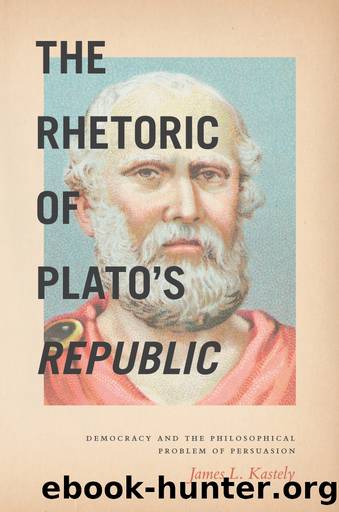The Rhetoric of Plato's Republic by James L. Kastely;

Author:James L. Kastely; [Kastely, James L.]
Language: eng
Format: epub
ISBN: 9780226278766
Publisher: University of Chicago Press
Published: 2015-07-16T05:00:00+00:00
CHAPTER SEVEN
A Rhetorical Account of Philosophy
As Socratesâs struggles to get a nonphilosophical audience to not dismiss philosophy out of hand as a useless or pernicious activity has revealed, philosophyâs abiding rhetorical challenge is to persuade a nonphilosophical audience of the value of a practice in which they are incapable of participating. To provide his audience with some appreciation of this practice, he now turns to an account of dialectic. To practice philosophy is to engage ultimately in dialectic, and, according to Socrates, one pursues dialectic only after a rigorous course of study has prepared a mature person to undertake this difficult form of inquiry (536dâ537d). Given this understanding of dialectic, Socrates cannot provide access to philosophy by engaging the nonphilosophic audience in dialectic. Not only would that be a futile exercise; but more importantly, it could be politically corrosive. Near the end of Book 7, Socrates is explicit about the genuinely injurious consequences of exposing a person who has not been adequately disciplined in philosophy. Such exposure leads to an ethical nihilism (537eâ539c). So Socrates cannot and should not communicate what philosophy is to a nonphilosophic audience by pursuing dialectic. He must find another way to effect persuasion.
If a nonphilosophic audience cannot possess philosophyâs understanding of itself, that does not mean that it would not be responsive to images of philosophy that allowed the audience to understand philosophyâs worth. These images could create an authority for philosophy and make philosophy as available as it needs to be for a nonphilosophical audience to become open to further argument about the need for and rightness of philosophical rule. Accordingly, what the Republic offers is not the actual practice of dialectic but an image of that practice. Platoâs most famous discussion of philosophyâhis image of the caveâneeds to be understood not as an instance of philosophic practice but as an effort at persuasion aimed at a nonphilosophic audience. In its presentation and defense of philosophy, the dialogue is not dialectical but rhetorical.
Download
This site does not store any files on its server. We only index and link to content provided by other sites. Please contact the content providers to delete copyright contents if any and email us, we'll remove relevant links or contents immediately.
Adding Value to Policy Analysis and Advice by Claudia Scott; Karen Baehler(461)
Sociological Perspectives of Health and Illness by Constantinos N. Phellas(449)
Race and American Political Development by unknow(447)
American Government and Politics Today by Steffen W. Schmidt Mack C. Shelley Barbara A. Bardes(436)
Human and Global Security : An Exploration of Terms by Peter Stoett(429)
Control Of Oil - Hardback by Kayal(411)
Entrepreneurship Education and Training: The Issue of Effectiveness by Colette Henry Frances Hill Claire Leitch(381)
Materializing the Middle Passage by Jane Webster;(370)
Advances in Child Development and Behavior, Volume 37 by Patricia J. Bauer(368)
The Catholic Church and European State Formation, AD 1000-1500 by Jørgen Møller(359)
The World According to China by Elizabeth C. Economy(347)
Left Is Not Woke by Susan Neiman(330)
Turkey's Relations with the West and the Turkic Republics: The Rise and Fall of the Turkish Model by Idris Bal(320)
Theories of Counseling and Psychotherapy: A Case Approach by Nancy L. Murdock(319)
Cross-Cultural Child Development for Social Workers by Lena Robinson(315)
Japan's Ainu Minority in Tokyo by Mark K. Watson(301)
Laboratory Life by Bruno Latour(296)
Beyond Service: State Workers, Public Policy, and the Prospects for Democratic Administration by Greg McElligott(287)
The Oxford Handbook of Museum Archaeology by Stevenson Alice;(280)
